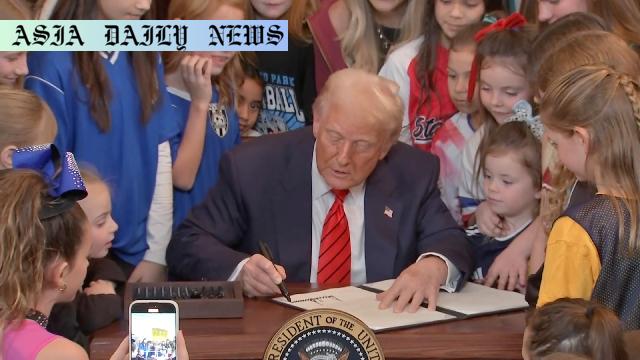Transgender athletes: Trump signs an executive order to ban transgender athletes from competing in women’s sports, citing fairness.
Ban targets transgender athletes from participating in women’s sports.
Federal funding to be rescinded for non-compliance.
Calls for the IOC to exclude transgender athletes from Olympics.
Policy focuses on 2028 Los Angeles Olympics.

Trump’s New Executive Order Sparks Debate
On Wednesday, President Donald Trump signed a controversial executive order aimed at banning transgender athletes from participating in women’s sports. The ceremony, held at the White House, was attended by female athletes who voiced their concerns regarding fairness in competition. The order mandates that federal funding will be revoked from any schools or organizations that fail to enforce the ban.
Details of the Executive Order
The executive order primarily targets transgender women—individuals assigned male at birth but identifying and competing as women. Trump indicated that this policy was essential to ensure equal opportunities and fairness for cisgender women in sports. Furthermore, the order directly calls upon the International Olympic Committee (IOC) to disallow transgender athletes from competing in the Olympic Games.
Focus on the Los Angeles 2028 Olympics
With the 2028 Los Angeles Summer Olympics in mind, the order reiterates its goal of protecting women’s sports at every level, from schools to global athletic events. The U.S. government has also committed to reviewing immigration policies, specifically targeting transgender athletes who aim to participate in women’s sports within the country.
Public Opinion Divided
The participation of transgender athletes in women’s sports has been a polarizing topic. According to an opinion poll conducted by the New York Times and Ipsos in January, 79% of respondents opposed allowing transgender women to compete in women’s athletics. While proponents of the ban argue that transgender women often retain physical advantages from male puberty, critics argue that such policies promote discrimination and undermine inclusivity.
Implications for Schools and Institutions
This executive order places immense pressure on schools and sports institutions across the United States. The threat of federal funding cuts might coerce organizations to align their policies with the mandate, even if it goes against their stance on inclusivity. Many institutions have begun to reassess their positions and policies in light of the executive order.
Responses and Backlash
Unsurprisingly, the executive order has sparked outrage from LGBTQ+ advocacy groups and human rights organizations. These groups argue that the ban not only marginalizes transgender people but also sets a precedent for discriminatory practices. On the other hand, conservatives and some female athletes have lauded the move as a necessary step to protect fairness in women’s sports.
Looking Ahead
As this new policy takes effect, many anticipate a wave of legal challenges and protests. States and schools will now have to navigate these changes while balancing ethical considerations and compliance. The discourse around fairness, inclusion, and athletic competitiveness is likely to evolve as further developments unfold.
Conclusion
Trump’s executive order on transgender athletes epitomizes the tension between fairness and inclusivity in modern sports. While the policy aims to protect female athletes, it has simultaneously deepened divisions and raised questions about discrimination and rights. The U.S. is now at a crossroads, tasked with finding a resolution that honors the principles of competitive equity while safeguarding the rights of all athletes. Only time will reveal the broader impact of this decision on the sporting world and society at large.
Commentary
An Uneasy Balance Between Fairness and Inclusivity
Trump’s executive order targeting transgender athletes in women’s sports has reignited a fiery debate on fairness versus inclusivity in athletics. While the directive seeks to address concerns about physical advantages that transgender women may have in sports, its sweeping nature has left questions about rights, discrimination, and broader social repercussions unresolved.
The Question of Competitive Integrity
Supporters believe Trump’s move is necessary to preserve the integrity of women’s sports. They argue that without such measures, female athletes will face an uneven playing field, potentially discouraging participation in competitive sports. This perspective, however, heavily leans on biological determinism, often overlooking the complexities surrounding gender identity and the hormone treatments many transgender athletes undergo.
Impact on Transgender Athletes
The most glaring issue with this policy is its effect on transgender individuals who are already marginalized. Excluding them from opportunities based on their identity sets a precedent for further segregation. Such mandates foster an environment of exclusion, perpetuating the notion that transgender individuals must be an exception to fairness rather than an integral part of equality.
Finding Common Ground
This complex issue demands nuanced solutions that transcend divisive policies. Open dialogue among stakeholders, including athletes, policymakers, and medical professionals, may pave the way for frameworks that uphold fairness without compromising inclusivity. Ultimately, the future of this discourse should reflect both scientific evidence and the values of human dignity.
Conclusion
Trump’s executive order may be seen as a bold stance, but it risks polarizing an already-sensitive issue. The decision underscores the need for thoughtful policymaking that considers the voices and rights of all individuals involved. While fairness in competition remains pivotal, true progress lies in fostering an environment where inclusivity and equity coexist.


